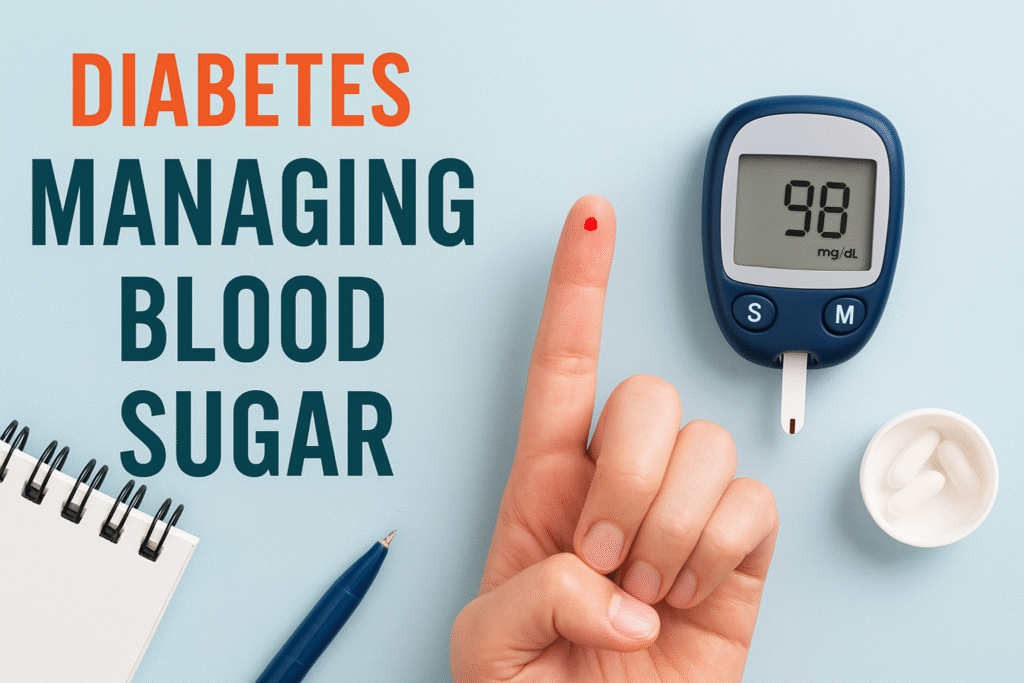Diabetes is one of the fastest-growing chronic diseases in the world. Type 1 diabetes and Type 2 diabetes are the most common. Many people confuse them because both affect the way the body regulates blood sugar. However, their causes, symptoms, treatment, and long-term effects are very different. Understanding the differences between Type 1 and Type 2 diabetes is crucial for early diagnosis, effective treatment, and prevention of serious complications.
Table of Contents
What is Type 1 Diabetes?
It is a condition that occurs when there is little or no insulin present in the body. Many people think it is a disease caused by eating too much sugar, but it is not. It is an autoimmune condition in which our immune system mistakenly attacks and destroys healthy beta cells in the pancreas (an organ located in the abdomen behind the stomach). Beta cells are the only source from which the production of the Insulin hormone takes place.
Insulin is an essential hormone that regulates blood glucose levels and helps glucose enter our body cells from the blood to be stored or used immediately as energy. Glucose is our body’s main source of energy that comes from the food we eat.
If the pancreas can not produce sufficient Insulin hormone, glucose builds up in the blood, resulting in a condition known as Hyperglycemia, which can affect several body organs, like the kidneys, eyes, and heart.
Causes
Anyone can be affected without warning, regardless of family history. Most likely, children, teenagers, or young adults.
Symptoms
- Too thirsty
- Frequent urination
- Excessive hunger
- Blurred vision
- Mental health problems
- Unexplained weight loss
Is there a permanent treatment available for type 1 diabetes or not?
There is no permanent cure for this disease, and unfortunately, there is no prevention for this disease, as it is an autoimmune condition; still, we can reduce the impact of symptoms by adopting a healthy lifestyle and a balanced diet.
What is Type 2 Diabetes (Diabetes mellitus)?
It is a metabolic disorder and a chronic (persistent, long-term) condition that occurs when the pancreas cannot produce enough insulin or body cells are not responding to insulin (Insulin resistance) as they should to absorb glucose molecules streaming in the blood, or both, resulting in high blood sugar levels.
Causes
- Lack of physical activity
- Eating processed food, carbohydrate-rich food, and saturated fats.
- Long-term stress and lack of quality sleep.
Symptoms
- Excessive thirst
- Frequent urination
- Excessive hunger
- Slow healing of wounds
- Tingling in hands or feet
- Physical weakness
- Weight loss
Women may experience frequent vaginal yeast infections and urinary tract infections.
If you have the above symptoms, consult your health care provider and get regular monitoring of blood glucose levels.
Complications
- Heart attack and stroke
- Kidney failure
- Damage to the retinal nerves can cause blindness
- Chance of getting Dementia and Alzheimer’s
Risk factors
- If your Biological parent or sibling has Diabetes
- Eating junk food and bakery items
- Having belly fat
- LDL (low-density lipoproteins)
- Sitting for long durations
- High blood pressure
- Polycystic ovarian syndrome (PCOS) in women
Can type 2 Diabetes be reversed?
- Obviously! There is no cure for type 2 diabetes. It can be reversed through lifestyle choices like regular physical exercise for 150 minutes or more each week, 30 minutes of evening walk, and quality sleep for 7 to 8 hours.
- Intermittent fasting can help slow the release of glucose into the blood.
- Eating leafy and green veggies, whole grains (have low glycemic index), foods containing good fats like nuts, and cooking food with cold-pressed oil.
- Avoid high-carbohydrate food, and adopt high-fibre, protein, and nutrient-rich food.
- Avoid alcohol intake and tobacco use.
Source: World Health Organization (WHO)
Conclusion
Although both conditions involve blood sugar regulation, the differences between the two types of diabetes are significant. Type 1 is an autoimmune condition that requires lifelong insulin therapy, while type 2 is largely lifestyle-related and can often be managed or even prevented through healthy lifestyle choices. The key message is that awareness and proactive care are essential. Whether it’s type 1 or type 2, early detection and proper management can help prevent complications and support a healthy, active life.

